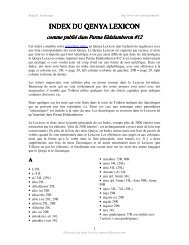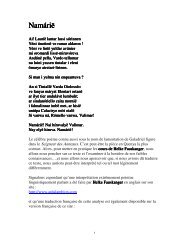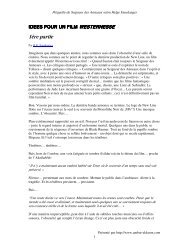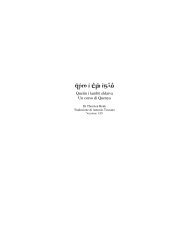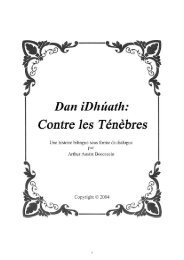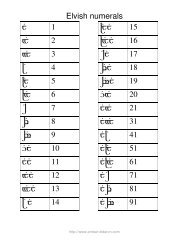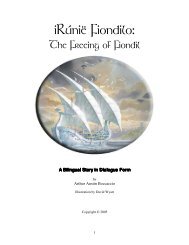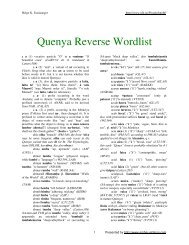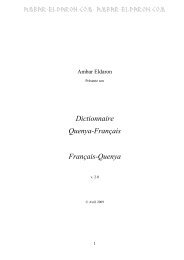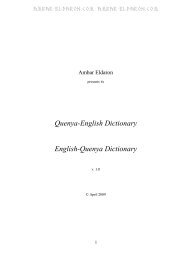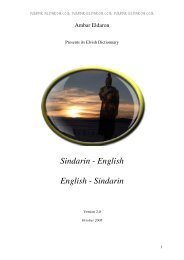English – Quenya - Ambar Eldaron
English – Quenya - Ambar Eldaron
English – Quenya - Ambar Eldaron
You also want an ePaper? Increase the reach of your titles
YUMPU automatically turns print PDFs into web optimized ePapers that Google loves.
Helge K. Fauskanger http://www.uib.no/People/hnohf/<br />
GOOD (of things) mára (fit, useful), GOOD<br />
(morally good) manë; GOOD OR FORTUNATE<br />
THING, see BOON. GOODBYE mára mesta <strong>–</strong><br />
MAG (see MA3), LT1:260, Arct<br />
GOODS armar (sg #arma if there is a sg)<br />
<strong>–</strong>3AR<br />
GOOSE ván, wán (pl. váni is given, but<br />
seems perfectly regular) <strong>–</strong>WA-N-<br />
GORE nasta (spear-point, spear-head,<br />
triangle), nehtë (spearhead, narrow promontory,<br />
wedge. Note: a homophone means<br />
"honeycomb"), mear (from a root possibly<br />
meaning "ooze") <strong>–</strong>SNAS/VT46:14, UT:282,<br />
LT1:260<br />
GORGE cilya (pass between hills, cleft)<br />
(so in Etym, but cf. #cirya in the name Calacirya<br />
"Pass of Light" [gen. Calaciryo in Namárië] <strong>–</strong><br />
though this clashes with cirya "ship". An early<br />
version of Namárië actually had Calacilyo, not<br />
Calaciryo; see An Introduction to Elvish p. 5) <strong>–</strong><br />
KIL<br />
GORTHAUR Sauron (Þ) <strong>–</strong>Silm:418 cf.<br />
THUS<br />
GOSPEL evandilyon <strong>–</strong>QL:36<br />
GOTHMOG Cosomot (prob. *Cosomoc-,<br />
cf the alternative form Cosomoco) <strong>–</strong>LT1:258<br />
GOVERN #tur- (attested as turin<br />
"I...govern", 1st pers. aorist), pa.t. turnë (wield,<br />
control). LT1:273 has vard- "rule, govern", but<br />
this is hardly a valid word in LotR-style <strong>Quenya</strong>.<br />
<strong>–</strong>TUR<br />
GOVERNANCE heren (fortune) <strong>–</strong>KHER<br />
GOVERNOR cáno (chieftain, commander;<br />
see COMMANDER for details) <strong>–</strong>PM:345, 361-<br />
362<br />
GRACE #Eruanna (literally *"God-gift, gift<br />
of God"), attested in the genitive form Eruanno.<br />
Also #erulissë, literally "God-sweetness"<br />
(attested in the instrumental case: erulissenen),<br />
or simply lissë, literally "sweetness". The word<br />
mána is also used for a grace or boon; see<br />
BOON. Adjective HAVING GRACE, perhaps<br />
manaitë (the form is not fully explained by<br />
Tolkien). <strong>–</strong>VT43:28, 29, VT44:18, VT49:41, 42<br />
GRACIOUS raina (smiling, sweet-faced).<br />
NOTE: A homophone means "nettled, enlaced".<br />
<strong>–</strong>VT44:35<br />
GRADE #tyellë (only pl tyeller is attested<br />
<strong>–</strong> note irregular plural instead of the expected<br />
form **tyelli) <strong>–</strong>LotR:1153<br />
GRAIN orë (ori-) <strong>–</strong>QL:50<br />
GRAMMAR tengwesta (system or code of<br />
signs) <strong>–</strong>TEK cf. WJ:394<br />
GRANDCHILD indyo (descendant) (Indyo<br />
looks like Vanyarin <strong>Quenya</strong>; the combination<br />
ndy became ny in Noldorin <strong>Quenya</strong> [see<br />
MIDDLE]. The Noldor likely said inyo, which<br />
form occurred in a deleted marginal note in the<br />
Etymologies). <strong>–</strong>ÑGYO(N), VT46:19<br />
GRANT lav- (yield, allow) <strong>–</strong>DAB<br />
GRASP mapa- (seize). This word was<br />
struck out in one of Tolkien's earlier word-lists,<br />
but in Etym it was restored. In early material<br />
occurs map- "seize, take" with pa.t. nampë. <strong>–</strong><br />
MAP, LT2:339, QL:59<br />
GRASS salquë, (stiff and dry:) sara (Þ)<br />
(bent) <strong>–</strong>SALAK, STAR<br />
GREAT (in size) alta (large) (The form<br />
alat- is used in compounds when the next word<br />
has an initial vowel, as in Alatairë. Tolkien's<br />
gloss of alta, alat- was actually illegible, and I<br />
give the root meaning of the stem ÁLAT. The<br />
meaning of the <strong>Quenya</strong> word cannot differ too<br />
widely from it, for Alatairë is said to correspond<br />
to "Noldorin" Belegoer [in LotR-style Sindarin<br />
Belegaer], The Great Sea.) <strong>–</strong> An early [TLT]<br />
word for "great", velicë, is possibly obsolete in<br />
LotR-style <strong>Quenya</strong>: In LT1:254 velicë is said to<br />
correspond to Gnomish beleg, but according to<br />
LR:352 the stem from which beleg is derived is<br />
"not found in Q[uenya]").-ÁLAT, cf. BEL, cf.<br />
Silm:428, LT1:254<br />
GREAT BEAR see SICKLE OF THE<br />
VALAR.<br />
GREAT LONGING mavoinë <strong>–</strong>LT2:345<br />
GREAT NUMBER <strong>–</strong> in a very great<br />
number: úvëa (abundant) <strong>–</strong>UB<br />
GREAT QUANTITY úvë (abundance) <strong>–</strong>UB<br />
GREAT WOOD taurë (forest) <strong>–</strong>TAWAR<br />
GREED milmë; GREEDY milca <strong>–</strong>MIL-IK<br />
GREEN laica (so in Letters:282; earlier<br />
sources have laiqua, whereas laica meant<br />
something wholly different ["keen, piercing"] in<br />
earlier material: LT2:337), wenya (yellow-green,<br />
fresh), ezel, ezella (adopted from Valarin; only<br />
used in Vanyarin <strong>Quenya</strong>)."Green" is expressed<br />
as a mere prefix lai- (representing the root<br />
underlying the adjective laica) in: GREEN-<br />
ELVES Laiquendi; cf. also VERDIGRIS =<br />
lairus. GREENNESS wén, laiquassë<br />
(freshness, youth). <strong>–</strong>LÁYAK/LT1:267, WJ:399,<br />
GWEN, WJ:385, LT1:267<br />
GREY #mista (isolated from lassemista<br />
"leaf-grey"), also hiswa, but the most usual word<br />
for "grey" may be sindë (stem *sindi-) (Þ) or<br />
sinda (Þ). (WJ has sindë "pale or silvery grey",<br />
wheras sinda is given in Silm:438; cf. also<br />
sindanoriello "from a grey land", Sindacollo<br />
"Grey-cloak" and Sindar "Grey-Elves, *Grey<br />
Ones".)GREY-ELVES Sindar (Þ) (sg. Sinda),<br />
less commonly Sindeldi (sg Sindel); GREY-<br />
CLOAK Sindacollo, Singollo (Þ) (so in<br />
Wordlist last updated July 5th, 2008 36 Presented by http://www.ambar-eldaron.com



